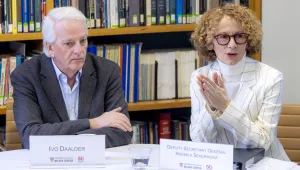AGREE
Secure Vital Financial Support for Ukraine: By seizing Russian assets, Ukraine can receive direct financial aid for its immediate military needs and longer-term reconstruction needs, circumventing the need for political approval in the US and Europe. This approach minimizes dependence on taxpayer money, offering a practical solution to fund Ukraine’s victory and recovery efforts efficiently. Furthermore, the move sends a strong message of accountability, ensuring that those responsible for unwarranted aggression bear the financial burden of their actions. Consequently, the West can reinforce the principles of justice and sovereignty.
Moral and Legal Precedent: Previous historical instances, such as the response to Iraq’s invasion of Kuwait, demonstrate that aggressors should compensate for the destruction they commit. The argument then and now is both a moral obligation and a legal possibility with an immediate need for the application of justice in international relations. This precedent underlines the principle that those who violate international norms must be held accountable, serving as a foundation for actions taken against nations that engage in unlawful aggression, thereby upholding the integrity of international law and order.
Trump-proofing Aid to Ukraine: As the U.S. Congress stalls and dithers in passing crucial aid to Ukraine, there is a very real possibility that Trump could be elected in November 2024. Such a potential future victory presents a time challenge to the Biden Administration and its European allies. Thus, the US should confiscate sovereign Russian assets to “Trump-proof” aid to Ukraine and guarantee its sustainability. This approach aims to secure future assistance, regardless of the US political landscape, emphasizing the urgency and strategic foresight necessary to support Ukraine effectively in the face of geopolitical uncertainties.
Ukrainian EU Integration as a Rebuke: Redirecting seized Russian assets to Ukraine could be framed as an investment in the country's integration into the European Union and its long-term prosperity. Such a move suggests a path to victory for Ukraine that includes economic stability and growth, despite any possible outstanding territorial disputes. This strategy aligns economic support with geopolitical objectives, reinforcing Ukraine's resilience and growth potential. It represents a strategic investment in the principles of sovereignty and economic development, underscoring the importance of sustained support for Ukraine's path toward European integration and the broader goal of maintaining regional stability.
Disagree
Risk of Isolation and De-Dollarization: The seizure of Russian sovereign assets could lead to international backlash, prompting countries to distance themselves from Western financial systems and leading to an exodus of money out of Western countries. This move could hasten global shifts towards alternative currencies, impacting the dominance of the dollar and euro. Dollar and euro holdings could significantly decrease as a result of a greater perceived risk associated with investment in the US and Europe.
Undermine the International System: Implementing Russian asset seizures would not only face hurdles, including domestic and international laws but could also undermine the integrity of the international legal system. Such a move would then run the risk of aggravating diplomatic relations and potentially fracturing international alliances and organizations. Additionally, the approach might set a precedent that other nations could exploit, further destabilizing the global order and eroding trust in international financial and legal institutions. The repercussions could extend beyond immediate geopolitical concerns, affecting global economic stability and the principles governing international law and state sovereignty.
Concerns for Russian Retaliation Are Not Idle: There is genuine concern here that Russia, faced with significant financial losses, would seek to retaliate in ways that could harm international businesses and escalate military conflicts, leading to wider instability. Russia has previously signaled readiness to retaliate with its seizure of both Russian subsidiaries of French yogurt maker Danone and Danish brewer Carlsberg. These actions hint at the broader risks of economic and military escalation that could follow such financial penalties, underscoring the delicate balance between imposing consequences for aggression and avoiding actions that could lead to greater instability or harm to international economic interests.
Implications for Future Peace Negotiations: Using seized assets as leverage in negotiations might inadvertently eliminate Russia's motivation to consent to peace agreements that encompass reparations, complicating the attainment of diplomatic solutions. Furthermore, this strategy could undermine the broader framework of international negotiations, setting a challenging precedent for conflict resolution. The approach risks not only stalling peace processes but also diminishing the effectiveness of diplomatic engagement as a tool for resolving international disputes, highlighting the intricate balance between punitive measures and the pursuit of lasting peace.







